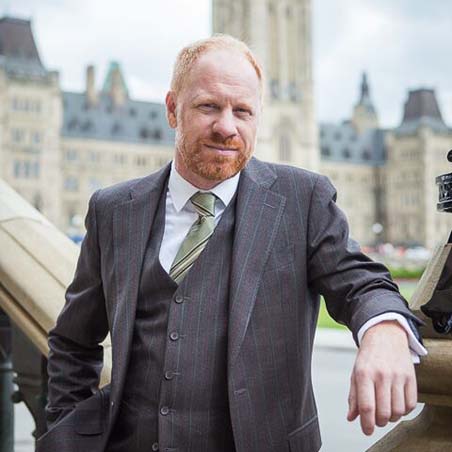Nevin French
Vice President Public Policy, Information Technology Association of Canada
Bachelor of Arts, History, 2000
You just have to learn to adapt.
There probably isn’t a collective noun for a group of civil service positions, but for Nevin French, if there were, it might be an “excitement” of jobs.
“I have always just wanted to do work that interests me,” he says. This resulted in him moving across the country a few times as a public servant, between Ottawa with the Federal Government and the Government of Alberta in Edmonton. He has enjoyed them all—as a policy analyst with both Natural Resources Canada and Public Safety Canada. He’s been Manager of the Canadian Energy Strategy Secretariat. He’s been Deputy Director for European Commercial Affairs, and Senior Desk Officer for Russia with Global Affairs Canada (“That was really interesting to get to work in that area,” says Nevin, who holds a Master of European and Russian Studies). He’s also been a Senior Analyst with Fisheries and Oceans Canada. The list goes on. An excitement.
“I am able to adapt,” Nevin says. “I developed a reputation of being able to just ‘plug and play’. I can pick up new files and say ok, how do we drive this forward? It’s like doing the Foundation Year Program (FYP) at King’s. We’re doing Marx today. Next week it’s something else. You just have to learn to adapt.”
Nevin is an unabashed supporter of the liberal arts education he got at King’s and never passes up a chance to mention how it has shaped him.
“It is crucial in government, especially with busy files, is what does the Minister and senior management need to know, what does the next level down need to know, and the next level down. And you have to have that material ready and you really have to be able to parse and sum it up in as efficient a way as possible. It’s like doing a short essays or presentations.”
These days Nevin is Vice President of Government Policy with the Information Technology Association of Canada (ITAC). The association provides a bridge between the tech world and government.
“I engage at the federal and provincial levels on big picture policies in the digital economy—basically economic issues to do with tech,” Nevin says. “Our membership includes some of the largest multinationals in the world, like IBM, Apple, Google and Facebook. We also have about 200 small and medium size enterprises. So, we engage with government and government engages with us in terms of the policy needed in order for Canada to be successful in the global tech community.”
Success is a broad term and can cover issues such as cyber security, privacy and copyright.
“One of the most interesting things I have done is testify in front of Parliament on the copyright review by the Industry Committee of MPs. Our industry’s major concerns involve artificial intelligence (AI) and machine learning. I had about two weeks to learn as much as I could,” Nevin says, then again thinks back to his time at King’s. “It was like going into your FYP oral exams—giving a presentation and then being prepared to be grilled by your professors.”
Along with his ability to adapt, lead, research and present clear and concise briefs, Nevin also knows inside and out how government works. It is a valuable asset for both his ITAC membership and government.
“Government doesn’t do well creating policy on the fly. Technology is changing so quickly you have to be careful setting policy to respond to the crisis of the day. That technology may not be relevant in five years. We ask governments to aim for a more principles-based approach.”
It’s the kind of thoughtful work that those who study liberal arts are uniquely qualified for, Nevin says.
“When you think about issues of privacy, there is going to be such a need for people with a strong background in subjects like ethics. Someone with a Contemporary Studies Program (CSP) background, or a background in Classics—they are going to have a good approach to how we will need to think about evolving principles of privacy in the future. There are lots of people who can handle the bells and whistles of the new technologies but being able to understand what modern privacy means is going to be very important for tech companies to understand.”
Posted: September 2019
 Connect with Nevin French
Connect with Nevin French